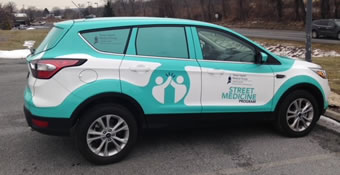Addressing Disparities of Care

The Accreditation Council for Graduate Medical Education (ACGME) has recommended that all residents receive education and experience in disparities of care. The Tower Health System endeavors to do exactly this in many different ways, thereby striving to live up to our motto of "Advancing Health. Transforming Lives." Residents are involved with the care of patients, both inpatient and outpatient, who have difficulty accessing medical care. There are many outreach programs arising from all departments in the hospital, which are separate from organized inpatient and outpatient care. These programs include international and domestic medical mission trips, free clinics such as the Western Berks Clinic and Faith Care Clinic, as well as home-based care and periodic health fairs. Social out-reach programs include Project Connect. The health system is one of the few in the country to receive a multi-million dollar grant to form the Berks Accountable Care Consortium, to develop a model of regional coordination between health systems and community organizations.
Our Street Medicine program provides care to the homeless and those who cannot access medical care. After the hurricane in Puerto Rico, the program was able to meet the needs of those who were left destitute and required immediate medical care. Through funding from many organizations and individuals including the Friends of Reading Hospital and the Reading Hospital Foundation, medical supplies to fill backpacks and purchase vehicles has made this life-saving mission a reality for those on the street and in homeless shelters, and has been a personally fulfilling experience for the residents and other health care personnel privileged to provide this service to those in need. Your experience in meeting the medical needs of these individuals will make your residency experience more meaningful and fulfilling, and will provide much needed care to vulnerable populations.
Quality Improvement Training
A year long, learn by doing, program that gives the resident skills to make important changes in the care of groups of patients. Resident teams choose their areas for process improvement and receive regular training and support to implement their projects. Learn how to make a system-wide difference with small changes in a real system.
Portfolio Development
The future of becoming an outstanding clinician requires the capacity to self-reflect on current performance and develop strategies to improve. The Reading Hospital Portfolio program helps our residents learn how to organize and monitor their accomplishments and define strategies for improvement. You are the best guide to your own self-improvement, and you and your mentor help set you on a path to become the doctor you want to be.
Direct Observation
One of our faculty members has developed an observation tool that has been shown to out-perform the standard American Board of Internal Medicine assessment tool. Formative evaluation and feedback will be provided by highly trained physicians on multiple occasions throughout your residency, many more constructive observations than at most sites. This allows for a much more rapid rate of performance improvement on the part of the resident.
Availability of Staff
Our graduates consistently emphasize the strength of the positive mentoring relationships experienced during their training at Reading. In addition to a formal mentoring program with one of our core faculty, there are daily contacts with supportive faculty and other staff, with whom to share experiences and develop important personal and professional bonds.
Scholarly Activity
No matter what level of skill the resident has gained when entering our program, opportunities exist to develop further. The science of clinical inquiry and investigation is a key skill for all residents, whether or not they plan a research career. All residents will learn the fundamentals of summarizing a key clinical issue, accurately reviewing and analyzing the literature, and addressing an appropriate research question. All residents have an opportunity to work with a mentor, a faculty research facilitator, and the head of our Research Division to support their goals in developing and implementing a research project.
The Learner-Manager-Educator Model
With competency-based progression, we have adopted the learner-manager-educator model for our general medical wards experience. At the start of your intern year, you will establish your foundational skills and medical knowledge and have close supervision. As you progress through internship and into your second year, you will transition into the role of a manager, where you will work one-on-one with a hospitalist. Here, you will build on your foundational skills, but also take part in state-of-the-art transitions-of-care and multidisciplinary team management quality improvement efforts. By adding these skills to your skillset, you will be ready to assume the role of the educator. As an educator, you will be able to achieve mastery of complex cases and teach the next generation of learners on your team.
Physician Wellness
Doctors, regardless of their level of training, are at high risk for burnout that can lead to dire consequences personally and professionally. The emphasis in most medical training has been on the technical skills of a physician, leaving emotional intelligence and resiliency development to be secondary or non-existent aspects of training. Our program values each resident as an individual and our goal is to identify what sparks joy for them in medicine while giving them tools to thrive rather than survive their chosen career. The curriculum emphasizes both mental and physical wellbeing through a series of workshops, small group didactics, and special events.
